Report on Management and Leadership Styles within Travelodge Hotel
VerifiedAdded on 2023/02/02
|12
|3010
|63
Report
AI Summary
This report provides a comprehensive analysis of Travelodge's management and leadership styles, including autocratic, democratic, paternalistic, and laissez-faire approaches, with a focus on the latter. It examines the hotel's hierarchical organizational structure and its alignment with a democratic management style, as well as its organizational culture based on Handy's model, particularly the role culture. The report further explores internal factors such as training, ambiguous culture, and ethics, and external factors like technology, political-legal aspects, and competition, which influence management styles. It identifies strengths and weaknesses related to these factors, offering insights into how Travelodge can improve its management and leadership practices. The report concludes with a discussion of how these styles and factors contribute to Travelodge's overall success within the service sector.
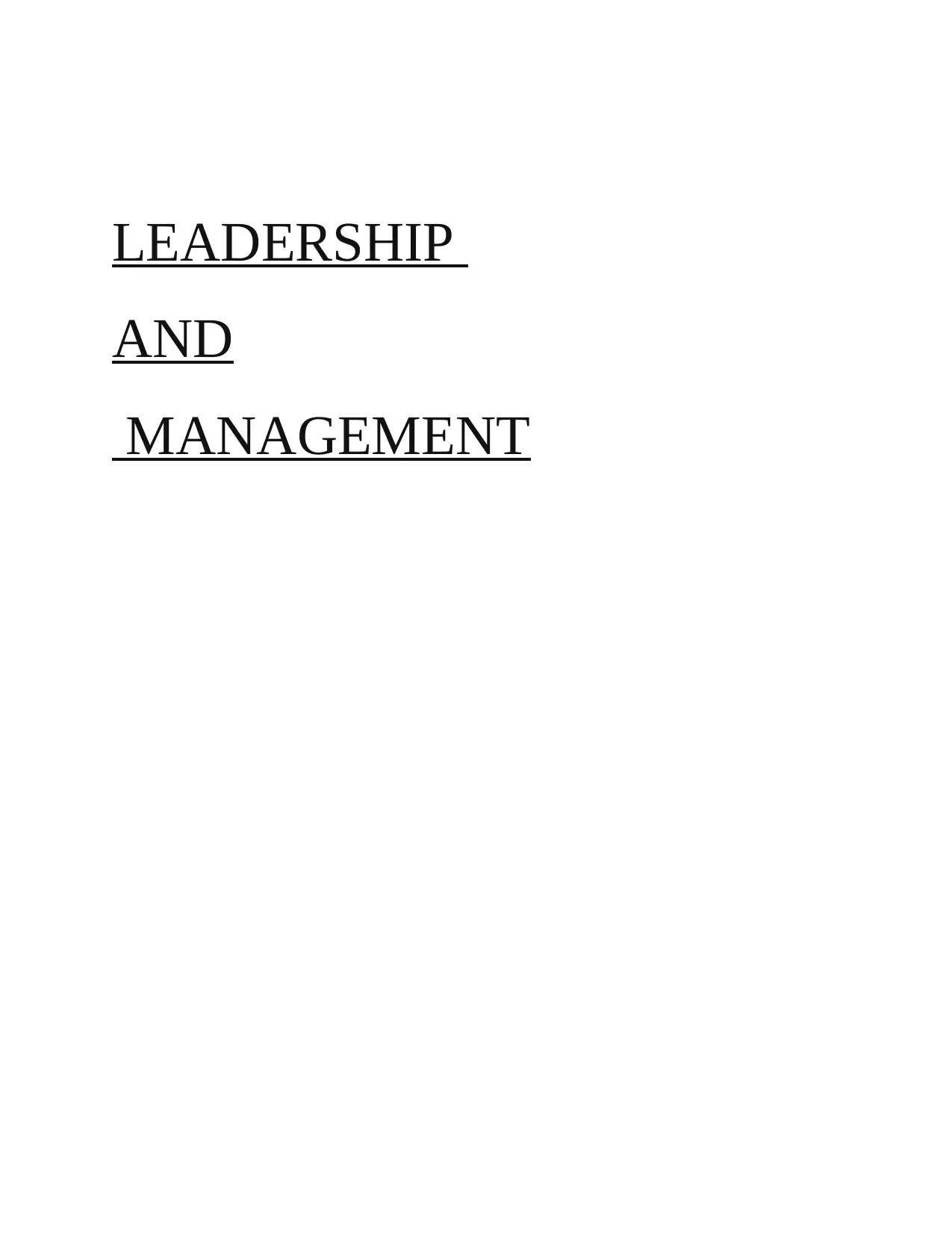
LEADERSHIP
AND
MANAGEMENT
AND
MANAGEMENT
Paraphrase This Document
Need a fresh take? Get an instant paraphrase of this document with our AI Paraphraser
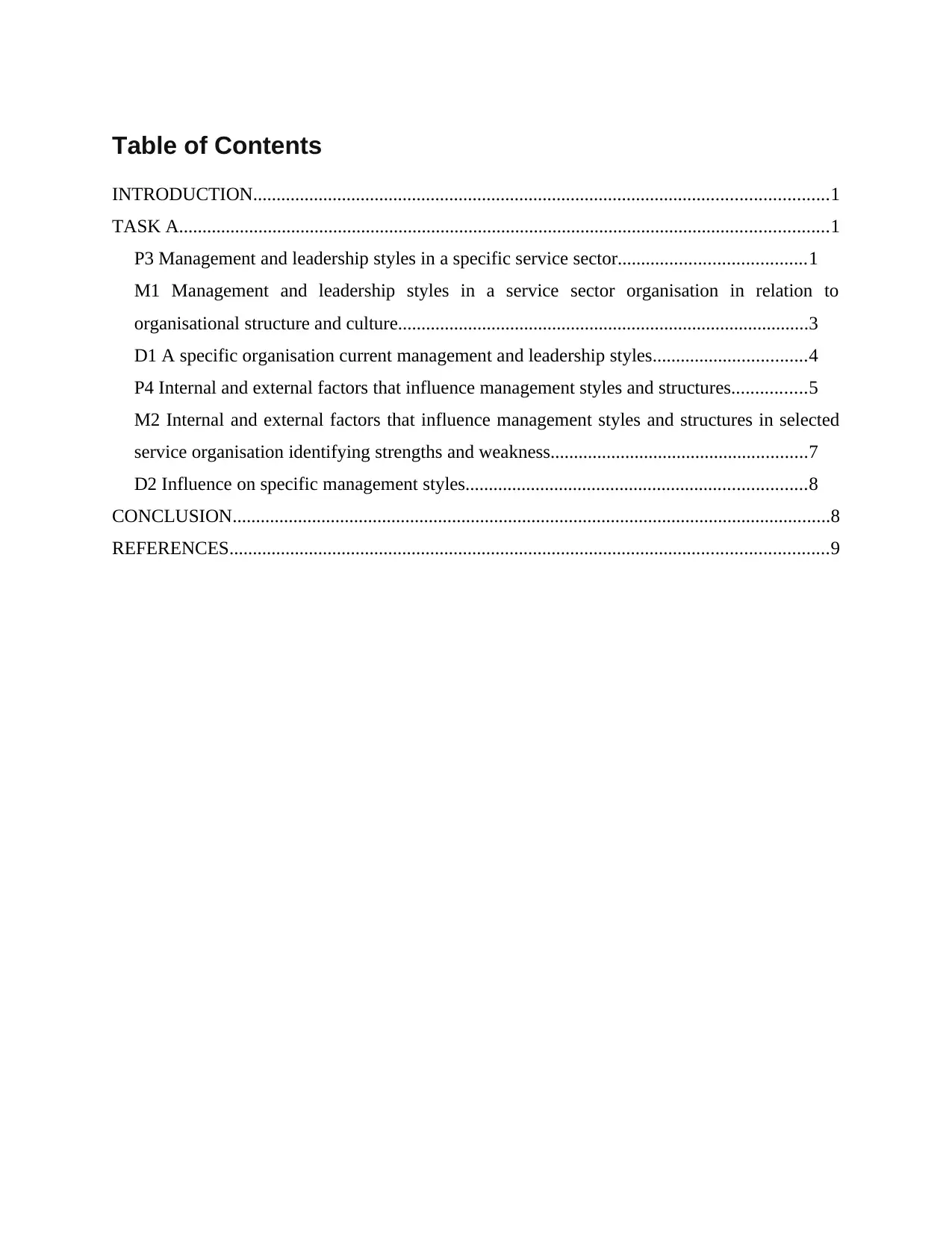
Table of Contents
INTRODUCTION...........................................................................................................................1
TASK A...........................................................................................................................................1
P3 Management and leadership styles in a specific service sector........................................1
M1 Management and leadership styles in a service sector organisation in relation to
organisational structure and culture........................................................................................3
D1 A specific organisation current management and leadership styles.................................4
P4 Internal and external factors that influence management styles and structures................5
M2 Internal and external factors that influence management styles and structures in selected
service organisation identifying strengths and weakness.......................................................7
D2 Influence on specific management styles.........................................................................8
CONCLUSION................................................................................................................................8
REFERENCES................................................................................................................................9
INTRODUCTION...........................................................................................................................1
TASK A...........................................................................................................................................1
P3 Management and leadership styles in a specific service sector........................................1
M1 Management and leadership styles in a service sector organisation in relation to
organisational structure and culture........................................................................................3
D1 A specific organisation current management and leadership styles.................................4
P4 Internal and external factors that influence management styles and structures................5
M2 Internal and external factors that influence management styles and structures in selected
service organisation identifying strengths and weakness.......................................................7
D2 Influence on specific management styles.........................................................................8
CONCLUSION................................................................................................................................8
REFERENCES................................................................................................................................9
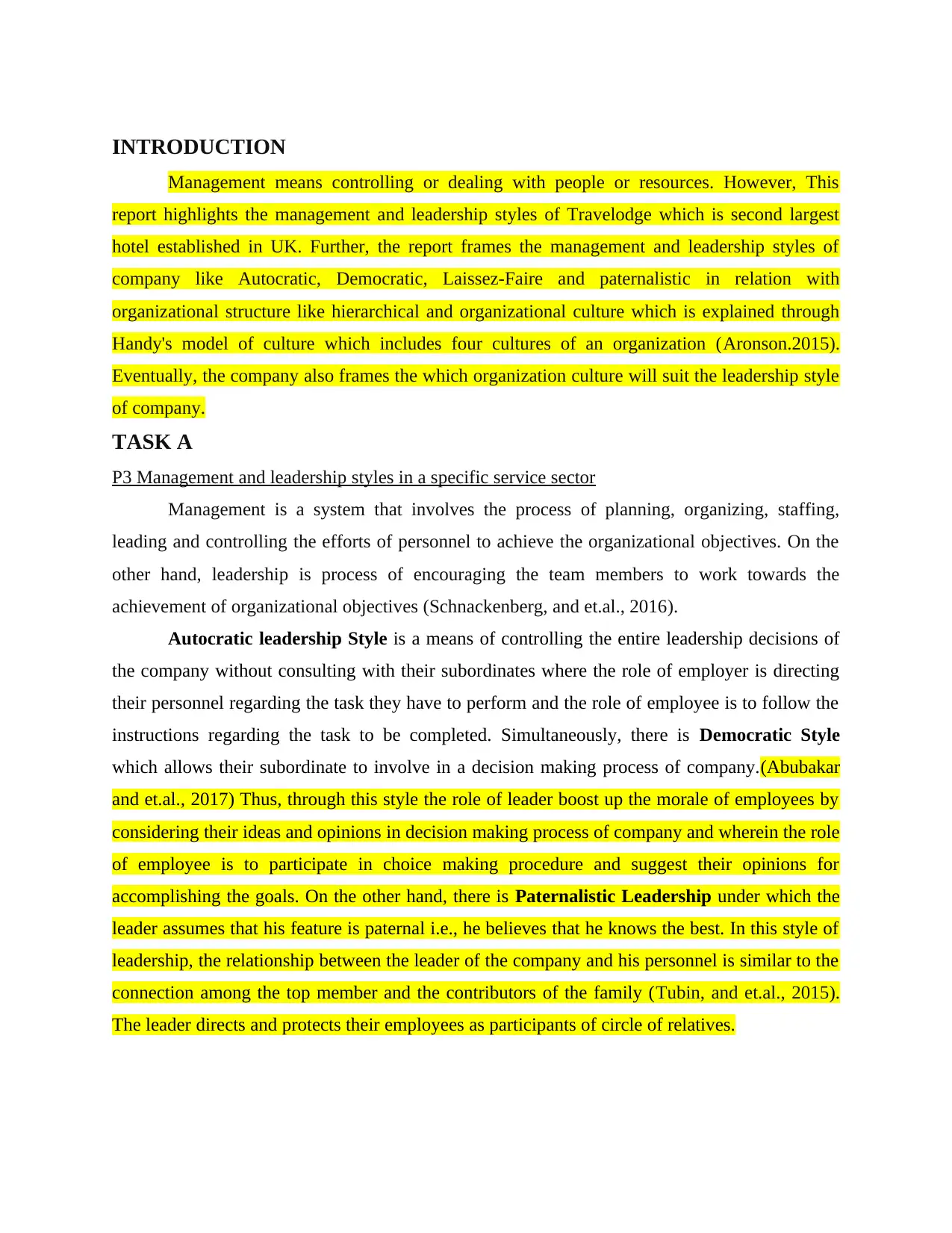
INTRODUCTION
Management means controlling or dealing with people or resources. However, This
report highlights the management and leadership styles of Travelodge which is second largest
hotel established in UK. Further, the report frames the management and leadership styles of
company like Autocratic, Democratic, Laissez-Faire and paternalistic in relation with
organizational structure like hierarchical and organizational culture which is explained through
Handy's model of culture which includes four cultures of an organization (Aronson.2015).
Eventually, the company also frames the which organization culture will suit the leadership style
of company.
TASK A
P3 Management and leadership styles in a specific service sector
Management is a system that involves the process of planning, organizing, staffing,
leading and controlling the efforts of personnel to achieve the organizational objectives. On the
other hand, leadership is process of encouraging the team members to work towards the
achievement of organizational objectives (Schnackenberg, and et.al., 2016).
Autocratic leadership Style is a means of controlling the entire leadership decisions of
the company without consulting with their subordinates where the role of employer is directing
their personnel regarding the task they have to perform and the role of employee is to follow the
instructions regarding the task to be completed. Simultaneously, there is Democratic Style
which allows their subordinate to involve in a decision making process of company.(Abubakar
and et.al., 2017) Thus, through this style the role of leader boost up the morale of employees by
considering their ideas and opinions in decision making process of company and wherein the role
of employee is to participate in choice making procedure and suggest their opinions for
accomplishing the goals. On the other hand, there is Paternalistic Leadership under which the
leader assumes that his feature is paternal i.e., he believes that he knows the best. In this style of
leadership, the relationship between the leader of the company and his personnel is similar to the
connection among the top member and the contributors of the family (Tubin, and et.al., 2015).
The leader directs and protects their employees as participants of circle of relatives.
Management means controlling or dealing with people or resources. However, This
report highlights the management and leadership styles of Travelodge which is second largest
hotel established in UK. Further, the report frames the management and leadership styles of
company like Autocratic, Democratic, Laissez-Faire and paternalistic in relation with
organizational structure like hierarchical and organizational culture which is explained through
Handy's model of culture which includes four cultures of an organization (Aronson.2015).
Eventually, the company also frames the which organization culture will suit the leadership style
of company.
TASK A
P3 Management and leadership styles in a specific service sector
Management is a system that involves the process of planning, organizing, staffing,
leading and controlling the efforts of personnel to achieve the organizational objectives. On the
other hand, leadership is process of encouraging the team members to work towards the
achievement of organizational objectives (Schnackenberg, and et.al., 2016).
Autocratic leadership Style is a means of controlling the entire leadership decisions of
the company without consulting with their subordinates where the role of employer is directing
their personnel regarding the task they have to perform and the role of employee is to follow the
instructions regarding the task to be completed. Simultaneously, there is Democratic Style
which allows their subordinate to involve in a decision making process of company.(Abubakar
and et.al., 2017) Thus, through this style the role of leader boost up the morale of employees by
considering their ideas and opinions in decision making process of company and wherein the role
of employee is to participate in choice making procedure and suggest their opinions for
accomplishing the goals. On the other hand, there is Paternalistic Leadership under which the
leader assumes that his feature is paternal i.e., he believes that he knows the best. In this style of
leadership, the relationship between the leader of the company and his personnel is similar to the
connection among the top member and the contributors of the family (Tubin, and et.al., 2015).
The leader directs and protects their employees as participants of circle of relatives.
⊘ This is a preview!⊘
Do you want full access?
Subscribe today to unlock all pages.

Trusted by 1+ million students worldwide
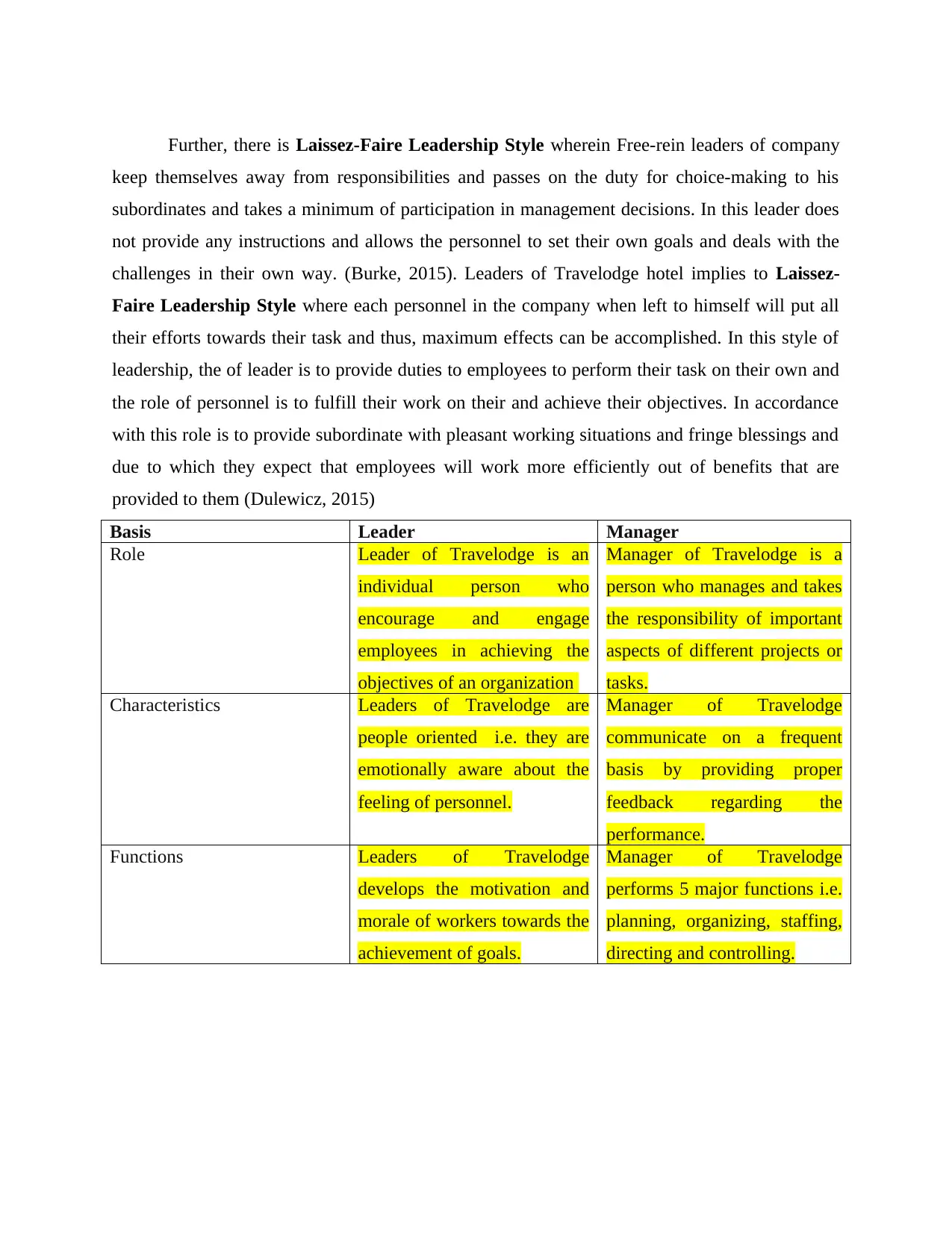
Further, there is Laissez-Faire Leadership Style wherein Free-rein leaders of company
keep themselves away from responsibilities and passes on the duty for choice-making to his
subordinates and takes a minimum of participation in management decisions. In this leader does
not provide any instructions and allows the personnel to set their own goals and deals with the
challenges in their own way. (Burke, 2015). Leaders of Travelodge hotel implies to Laissez-
Faire Leadership Style where each personnel in the company when left to himself will put all
their efforts towards their task and thus, maximum effects can be accomplished. In this style of
leadership, the of leader is to provide duties to employees to perform their task on their own and
the role of personnel is to fulfill their work on their and achieve their objectives. In accordance
with this role is to provide subordinate with pleasant working situations and fringe blessings and
due to which they expect that employees will work more efficiently out of benefits that are
provided to them (Dulewicz, 2015)
Basis Leader Manager
Role Leader of Travelodge is an
individual person who
encourage and engage
employees in achieving the
objectives of an organization
Manager of Travelodge is a
person who manages and takes
the responsibility of important
aspects of different projects or
tasks.
Characteristics Leaders of Travelodge are
people oriented i.e. they are
emotionally aware about the
feeling of personnel.
Manager of Travelodge
communicate on a frequent
basis by providing proper
feedback regarding the
performance.
Functions Leaders of Travelodge
develops the motivation and
morale of workers towards the
achievement of goals.
Manager of Travelodge
performs 5 major functions i.e.
planning, organizing, staffing,
directing and controlling.
keep themselves away from responsibilities and passes on the duty for choice-making to his
subordinates and takes a minimum of participation in management decisions. In this leader does
not provide any instructions and allows the personnel to set their own goals and deals with the
challenges in their own way. (Burke, 2015). Leaders of Travelodge hotel implies to Laissez-
Faire Leadership Style where each personnel in the company when left to himself will put all
their efforts towards their task and thus, maximum effects can be accomplished. In this style of
leadership, the of leader is to provide duties to employees to perform their task on their own and
the role of personnel is to fulfill their work on their and achieve their objectives. In accordance
with this role is to provide subordinate with pleasant working situations and fringe blessings and
due to which they expect that employees will work more efficiently out of benefits that are
provided to them (Dulewicz, 2015)
Basis Leader Manager
Role Leader of Travelodge is an
individual person who
encourage and engage
employees in achieving the
objectives of an organization
Manager of Travelodge is a
person who manages and takes
the responsibility of important
aspects of different projects or
tasks.
Characteristics Leaders of Travelodge are
people oriented i.e. they are
emotionally aware about the
feeling of personnel.
Manager of Travelodge
communicate on a frequent
basis by providing proper
feedback regarding the
performance.
Functions Leaders of Travelodge
develops the motivation and
morale of workers towards the
achievement of goals.
Manager of Travelodge
performs 5 major functions i.e.
planning, organizing, staffing,
directing and controlling.
Paraphrase This Document
Need a fresh take? Get an instant paraphrase of this document with our AI Paraphraser
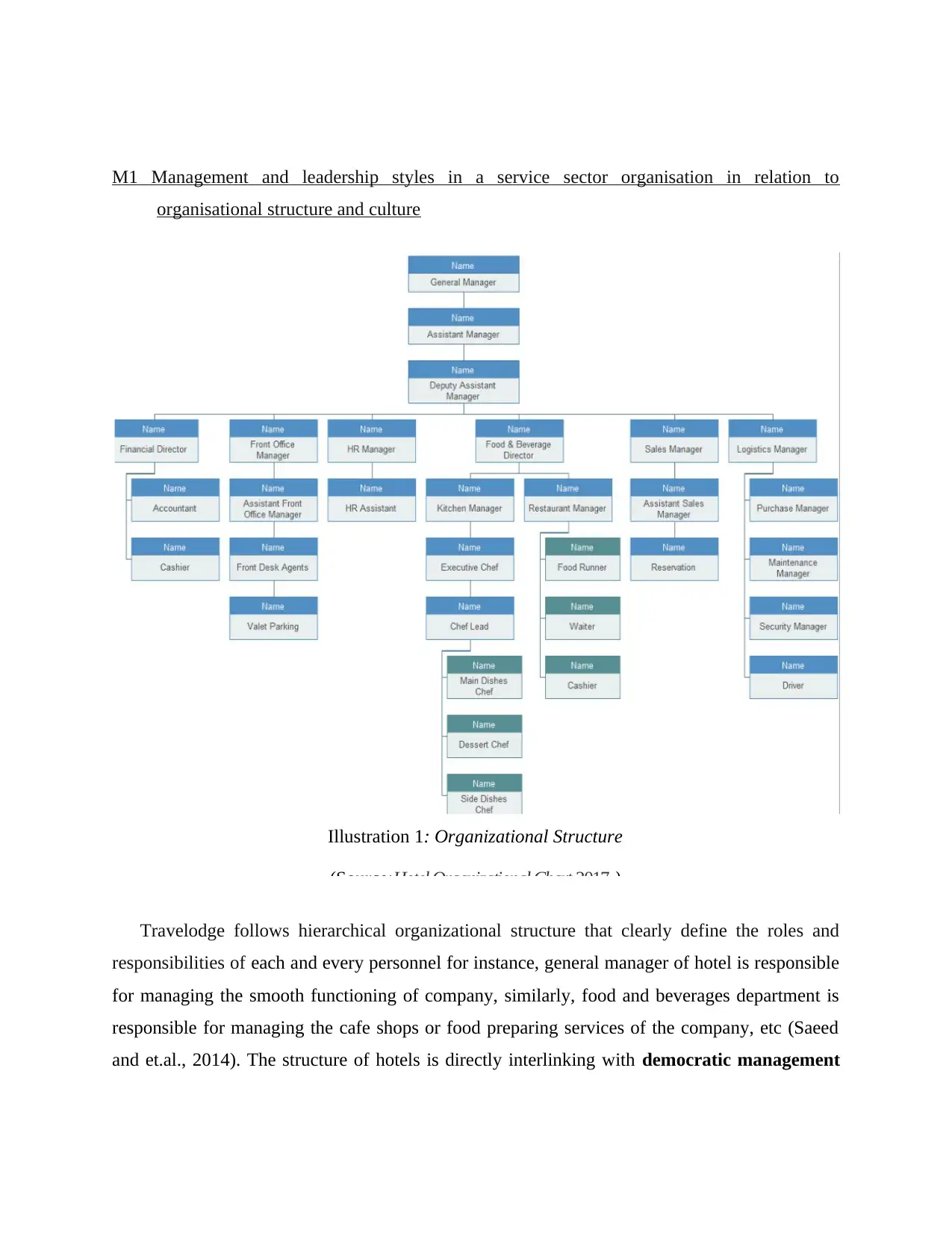
M1 Management and leadership styles in a service sector organisation in relation to
organisational structure and culture
Travelodge follows hierarchical organizational structure that clearly define the roles and
responsibilities of each and every personnel for instance, general manager of hotel is responsible
for managing the smooth functioning of company, similarly, food and beverages department is
responsible for managing the cafe shops or food preparing services of the company, etc (Saeed
and et.al., 2014). The structure of hotels is directly interlinking with democratic management
Illustration 1: Organizational Structure
(Source:Hotel Organizational Chart,2017 )
organisational structure and culture
Travelodge follows hierarchical organizational structure that clearly define the roles and
responsibilities of each and every personnel for instance, general manager of hotel is responsible
for managing the smooth functioning of company, similarly, food and beverages department is
responsible for managing the cafe shops or food preparing services of the company, etc (Saeed
and et.al., 2014). The structure of hotels is directly interlinking with democratic management
Illustration 1: Organizational Structure
(Source:Hotel Organizational Chart,2017 )
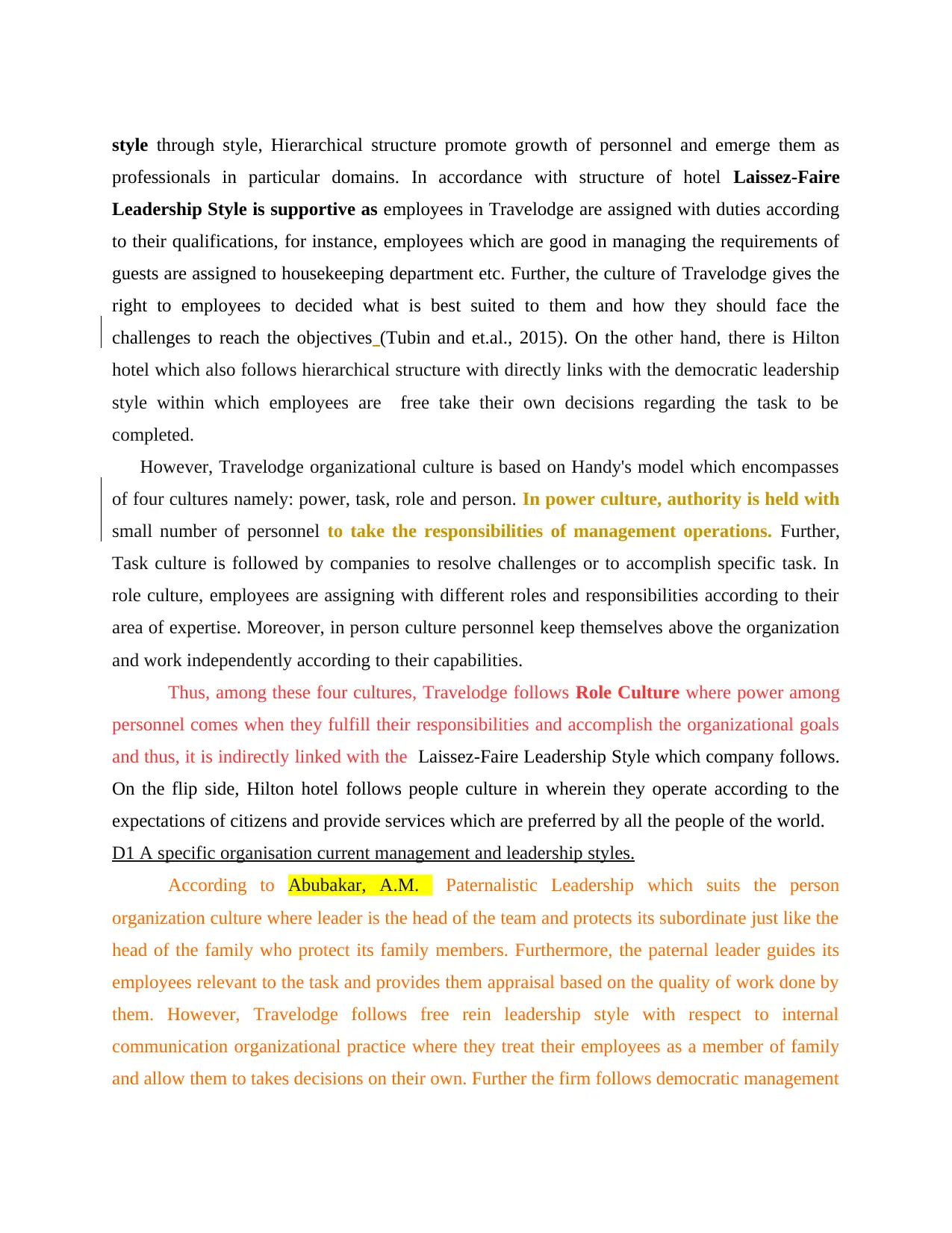
style through style, Hierarchical structure promote growth of personnel and emerge them as
professionals in particular domains. In accordance with structure of hotel Laissez-Faire
Leadership Style is supportive as employees in Travelodge are assigned with duties according
to their qualifications, for instance, employees which are good in managing the requirements of
guests are assigned to housekeeping department etc. Further, the culture of Travelodge gives the
right to employees to decided what is best suited to them and how they should face the
challenges to reach the objectives (Tubin and et.al., 2015). On the other hand, there is Hilton
hotel which also follows hierarchical structure with directly links with the democratic leadership
style within which employees are free take their own decisions regarding the task to be
completed.
However, Travelodge organizational culture is based on Handy's model which encompasses
of four cultures namely: power, task, role and person. In power culture, authority is held with
small number of personnel to take the responsibilities of management operations. Further,
Task culture is followed by companies to resolve challenges or to accomplish specific task. In
role culture, employees are assigning with different roles and responsibilities according to their
area of expertise. Moreover, in person culture personnel keep themselves above the organization
and work independently according to their capabilities.
Thus, among these four cultures, Travelodge follows Role Culture where power among
personnel comes when they fulfill their responsibilities and accomplish the organizational goals
and thus, it is indirectly linked with the Laissez-Faire Leadership Style which company follows.
On the flip side, Hilton hotel follows people culture in wherein they operate according to the
expectations of citizens and provide services which are preferred by all the people of the world.
D1 A specific organisation current management and leadership styles.
According to Abubakar, A.M. Paternalistic Leadership which suits the person
organization culture where leader is the head of the team and protects its subordinate just like the
head of the family who protect its family members. Furthermore, the paternal leader guides its
employees relevant to the task and provides them appraisal based on the quality of work done by
them. However, Travelodge follows free rein leadership style with respect to internal
communication organizational practice where they treat their employees as a member of family
and allow them to takes decisions on their own. Further the firm follows democratic management
professionals in particular domains. In accordance with structure of hotel Laissez-Faire
Leadership Style is supportive as employees in Travelodge are assigned with duties according
to their qualifications, for instance, employees which are good in managing the requirements of
guests are assigned to housekeeping department etc. Further, the culture of Travelodge gives the
right to employees to decided what is best suited to them and how they should face the
challenges to reach the objectives (Tubin and et.al., 2015). On the other hand, there is Hilton
hotel which also follows hierarchical structure with directly links with the democratic leadership
style within which employees are free take their own decisions regarding the task to be
completed.
However, Travelodge organizational culture is based on Handy's model which encompasses
of four cultures namely: power, task, role and person. In power culture, authority is held with
small number of personnel to take the responsibilities of management operations. Further,
Task culture is followed by companies to resolve challenges or to accomplish specific task. In
role culture, employees are assigning with different roles and responsibilities according to their
area of expertise. Moreover, in person culture personnel keep themselves above the organization
and work independently according to their capabilities.
Thus, among these four cultures, Travelodge follows Role Culture where power among
personnel comes when they fulfill their responsibilities and accomplish the organizational goals
and thus, it is indirectly linked with the Laissez-Faire Leadership Style which company follows.
On the flip side, Hilton hotel follows people culture in wherein they operate according to the
expectations of citizens and provide services which are preferred by all the people of the world.
D1 A specific organisation current management and leadership styles.
According to Abubakar, A.M. Paternalistic Leadership which suits the person
organization culture where leader is the head of the team and protects its subordinate just like the
head of the family who protect its family members. Furthermore, the paternal leader guides its
employees relevant to the task and provides them appraisal based on the quality of work done by
them. However, Travelodge follows free rein leadership style with respect to internal
communication organizational practice where they treat their employees as a member of family
and allow them to takes decisions on their own. Further the firm follows democratic management
⊘ This is a preview!⊘
Do you want full access?
Subscribe today to unlock all pages.

Trusted by 1+ million students worldwide
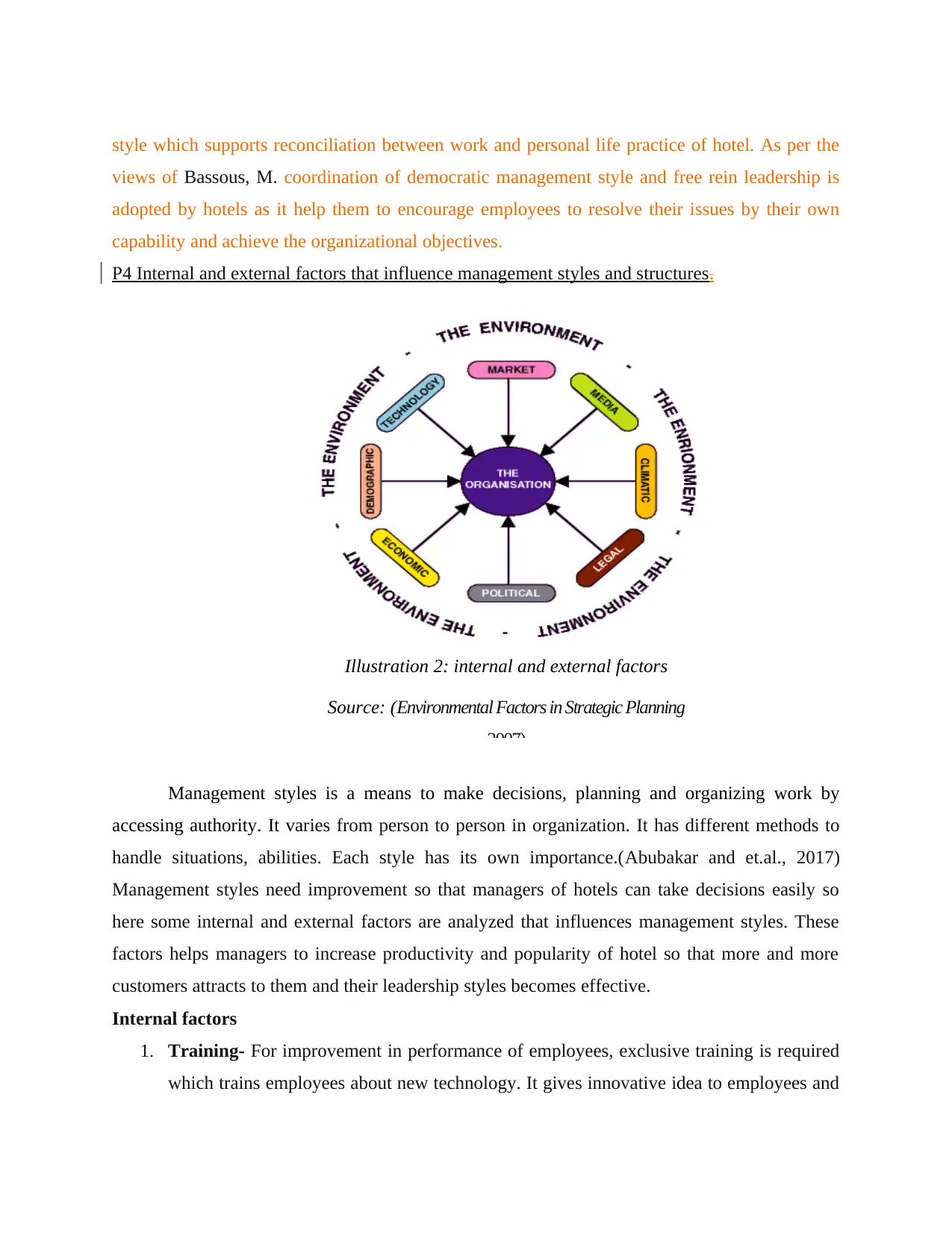
style which supports reconciliation between work and personal life practice of hotel. As per the
views of Bassous, M. coordination of democratic management style and free rein leadership is
adopted by hotels as it help them to encourage employees to resolve their issues by their own
capability and achieve the organizational objectives.
P4 Internal and external factors that influence management styles and structures.
Management styles is a means to make decisions, planning and organizing work by
accessing authority. It varies from person to person in organization. It has different methods to
handle situations, abilities. Each style has its own importance.(Abubakar and et.al., 2017)
Management styles need improvement so that managers of hotels can take decisions easily so
here some internal and external factors are analyzed that influences management styles. These
factors helps managers to increase productivity and popularity of hotel so that more and more
customers attracts to them and their leadership styles becomes effective.
Internal factors
1. Training- For improvement in performance of employees, exclusive training is required
which trains employees about new technology. It gives innovative idea to employees and
Illustration 2: internal and external factors
Source: (Environmental Factors in Strategic Planning
2007)
views of Bassous, M. coordination of democratic management style and free rein leadership is
adopted by hotels as it help them to encourage employees to resolve their issues by their own
capability and achieve the organizational objectives.
P4 Internal and external factors that influence management styles and structures.
Management styles is a means to make decisions, planning and organizing work by
accessing authority. It varies from person to person in organization. It has different methods to
handle situations, abilities. Each style has its own importance.(Abubakar and et.al., 2017)
Management styles need improvement so that managers of hotels can take decisions easily so
here some internal and external factors are analyzed that influences management styles. These
factors helps managers to increase productivity and popularity of hotel so that more and more
customers attracts to them and their leadership styles becomes effective.
Internal factors
1. Training- For improvement in performance of employees, exclusive training is required
which trains employees about new technology. It gives innovative idea to employees and
Illustration 2: internal and external factors
Source: (Environmental Factors in Strategic Planning
2007)
Paraphrase This Document
Need a fresh take? Get an instant paraphrase of this document with our AI Paraphraser
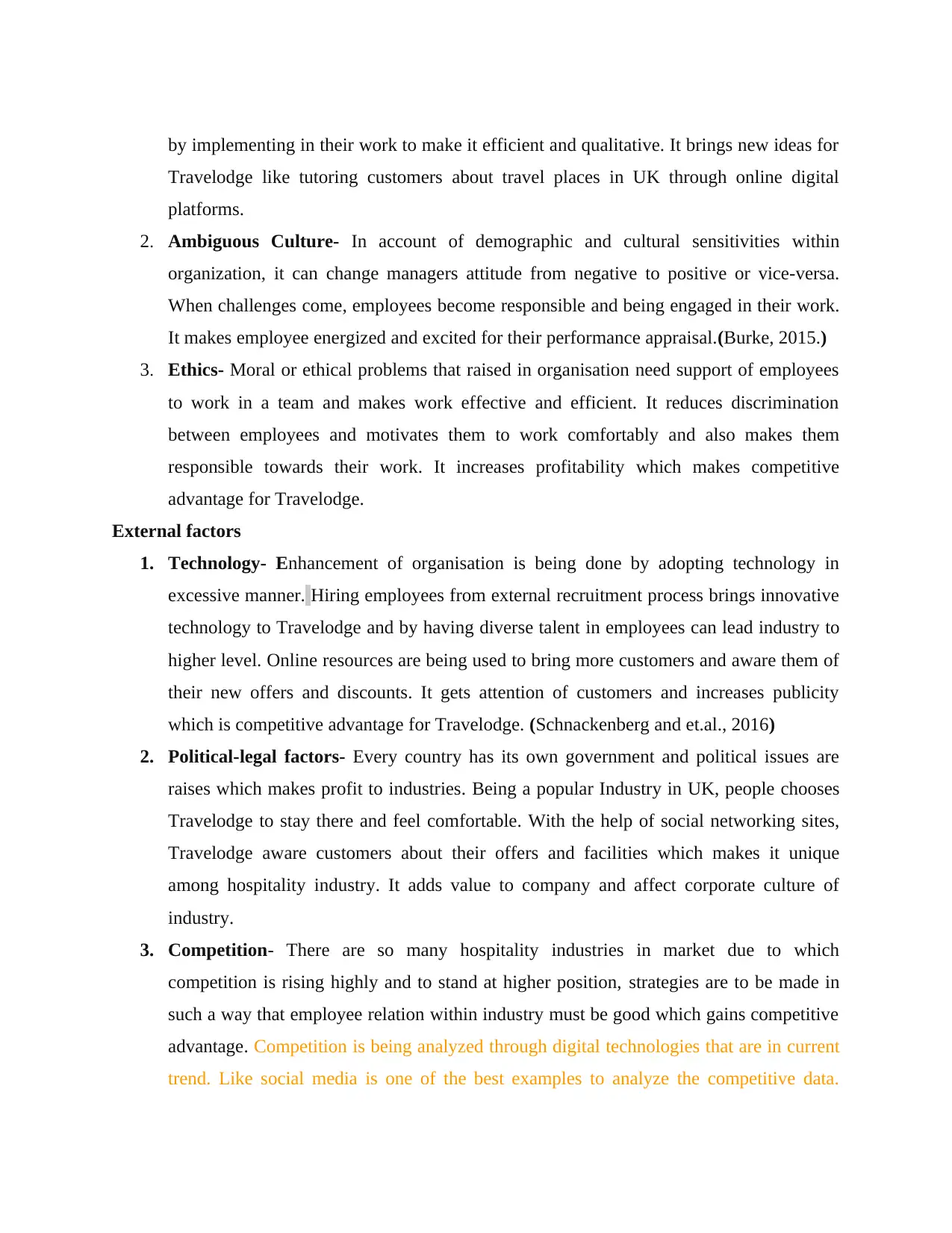
by implementing in their work to make it efficient and qualitative. It brings new ideas for
Travelodge like tutoring customers about travel places in UK through online digital
platforms.
2. Ambiguous Culture- In account of demographic and cultural sensitivities within
organization, it can change managers attitude from negative to positive or vice-versa.
When challenges come, employees become responsible and being engaged in their work.
It makes employee energized and excited for their performance appraisal.(Burke, 2015.)
3. Ethics- Moral or ethical problems that raised in organisation need support of employees
to work in a team and makes work effective and efficient. It reduces discrimination
between employees and motivates them to work comfortably and also makes them
responsible towards their work. It increases profitability which makes competitive
advantage for Travelodge.
External factors
1. Technology- Enhancement of organisation is being done by adopting technology in
excessive manner. Hiring employees from external recruitment process brings innovative
technology to Travelodge and by having diverse talent in employees can lead industry to
higher level. Online resources are being used to bring more customers and aware them of
their new offers and discounts. It gets attention of customers and increases publicity
which is competitive advantage for Travelodge. (Schnackenberg and et.al., 2016)
2. Political-legal factors- Every country has its own government and political issues are
raises which makes profit to industries. Being a popular Industry in UK, people chooses
Travelodge to stay there and feel comfortable. With the help of social networking sites,
Travelodge aware customers about their offers and facilities which makes it unique
among hospitality industry. It adds value to company and affect corporate culture of
industry.
3. Competition- There are so many hospitality industries in market due to which
competition is rising highly and to stand at higher position, strategies are to be made in
such a way that employee relation within industry must be good which gains competitive
advantage. Competition is being analyzed through digital technologies that are in current
trend. Like social media is one of the best examples to analyze the competitive data.
Travelodge like tutoring customers about travel places in UK through online digital
platforms.
2. Ambiguous Culture- In account of demographic and cultural sensitivities within
organization, it can change managers attitude from negative to positive or vice-versa.
When challenges come, employees become responsible and being engaged in their work.
It makes employee energized and excited for their performance appraisal.(Burke, 2015.)
3. Ethics- Moral or ethical problems that raised in organisation need support of employees
to work in a team and makes work effective and efficient. It reduces discrimination
between employees and motivates them to work comfortably and also makes them
responsible towards their work. It increases profitability which makes competitive
advantage for Travelodge.
External factors
1. Technology- Enhancement of organisation is being done by adopting technology in
excessive manner. Hiring employees from external recruitment process brings innovative
technology to Travelodge and by having diverse talent in employees can lead industry to
higher level. Online resources are being used to bring more customers and aware them of
their new offers and discounts. It gets attention of customers and increases publicity
which is competitive advantage for Travelodge. (Schnackenberg and et.al., 2016)
2. Political-legal factors- Every country has its own government and political issues are
raises which makes profit to industries. Being a popular Industry in UK, people chooses
Travelodge to stay there and feel comfortable. With the help of social networking sites,
Travelodge aware customers about their offers and facilities which makes it unique
among hospitality industry. It adds value to company and affect corporate culture of
industry.
3. Competition- There are so many hospitality industries in market due to which
competition is rising highly and to stand at higher position, strategies are to be made in
such a way that employee relation within industry must be good which gains competitive
advantage. Competition is being analyzed through digital technologies that are in current
trend. Like social media is one of the best examples to analyze the competitive data.
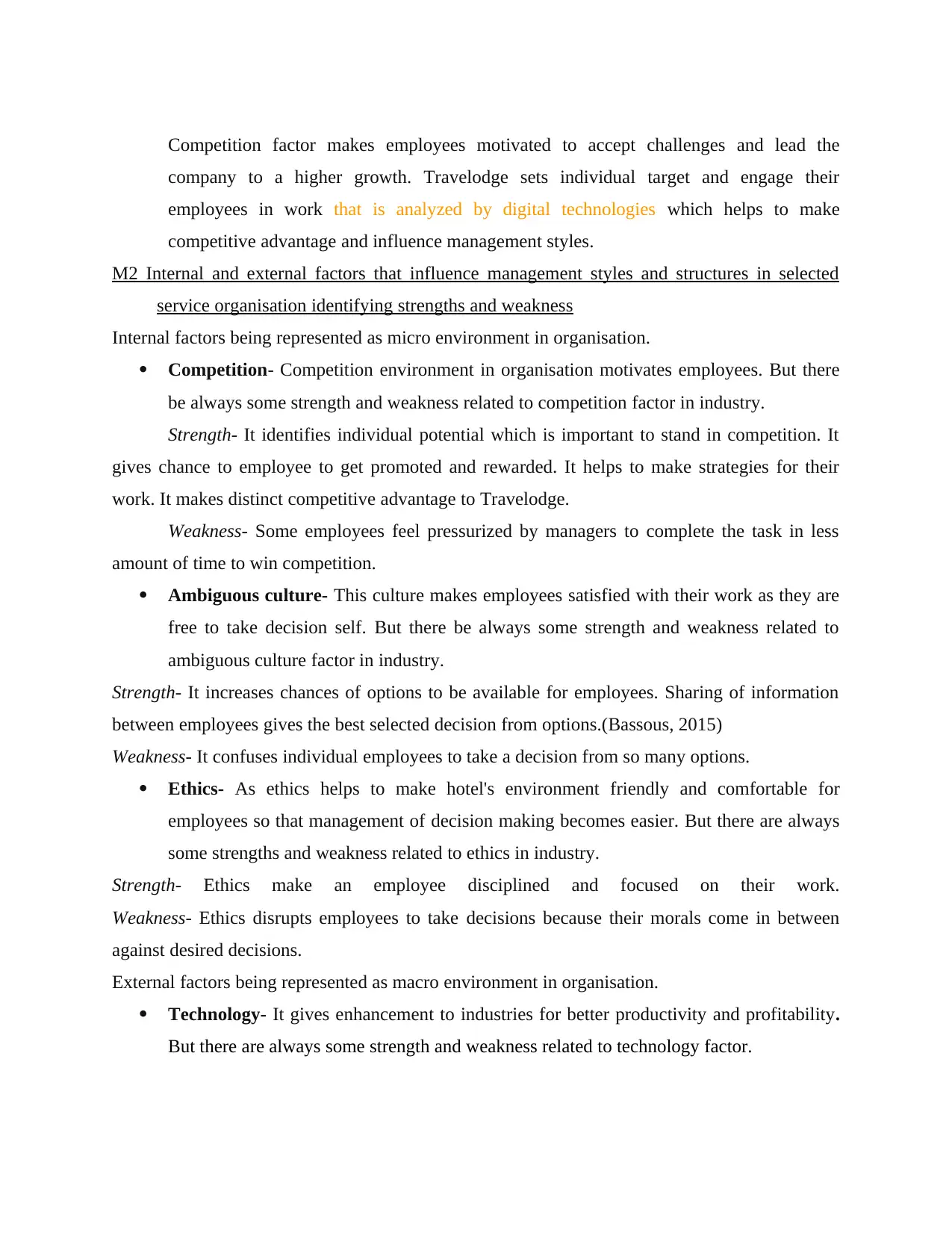
Competition factor makes employees motivated to accept challenges and lead the
company to a higher growth. Travelodge sets individual target and engage their
employees in work that is analyzed by digital technologies which helps to make
competitive advantage and influence management styles.
M2 Internal and external factors that influence management styles and structures in selected
service organisation identifying strengths and weakness
Internal factors being represented as micro environment in organisation.
Competition- Competition environment in organisation motivates employees. But there
be always some strength and weakness related to competition factor in industry.
Strength- It identifies individual potential which is important to stand in competition. It
gives chance to employee to get promoted and rewarded. It helps to make strategies for their
work. It makes distinct competitive advantage to Travelodge.
Weakness- Some employees feel pressurized by managers to complete the task in less
amount of time to win competition.
Ambiguous culture- This culture makes employees satisfied with their work as they are
free to take decision self. But there be always some strength and weakness related to
ambiguous culture factor in industry.
Strength- It increases chances of options to be available for employees. Sharing of information
between employees gives the best selected decision from options.(Bassous, 2015)
Weakness- It confuses individual employees to take a decision from so many options.
Ethics- As ethics helps to make hotel's environment friendly and comfortable for
employees so that management of decision making becomes easier. But there are always
some strengths and weakness related to ethics in industry.
Strength- Ethics make an employee disciplined and focused on their work.
Weakness- Ethics disrupts employees to take decisions because their morals come in between
against desired decisions.
External factors being represented as macro environment in organisation.
Technology- It gives enhancement to industries for better productivity and profitability.
But there are always some strength and weakness related to technology factor.
company to a higher growth. Travelodge sets individual target and engage their
employees in work that is analyzed by digital technologies which helps to make
competitive advantage and influence management styles.
M2 Internal and external factors that influence management styles and structures in selected
service organisation identifying strengths and weakness
Internal factors being represented as micro environment in organisation.
Competition- Competition environment in organisation motivates employees. But there
be always some strength and weakness related to competition factor in industry.
Strength- It identifies individual potential which is important to stand in competition. It
gives chance to employee to get promoted and rewarded. It helps to make strategies for their
work. It makes distinct competitive advantage to Travelodge.
Weakness- Some employees feel pressurized by managers to complete the task in less
amount of time to win competition.
Ambiguous culture- This culture makes employees satisfied with their work as they are
free to take decision self. But there be always some strength and weakness related to
ambiguous culture factor in industry.
Strength- It increases chances of options to be available for employees. Sharing of information
between employees gives the best selected decision from options.(Bassous, 2015)
Weakness- It confuses individual employees to take a decision from so many options.
Ethics- As ethics helps to make hotel's environment friendly and comfortable for
employees so that management of decision making becomes easier. But there are always
some strengths and weakness related to ethics in industry.
Strength- Ethics make an employee disciplined and focused on their work.
Weakness- Ethics disrupts employees to take decisions because their morals come in between
against desired decisions.
External factors being represented as macro environment in organisation.
Technology- It gives enhancement to industries for better productivity and profitability.
But there are always some strength and weakness related to technology factor.
⊘ This is a preview!⊘
Do you want full access?
Subscribe today to unlock all pages.

Trusted by 1+ million students worldwide
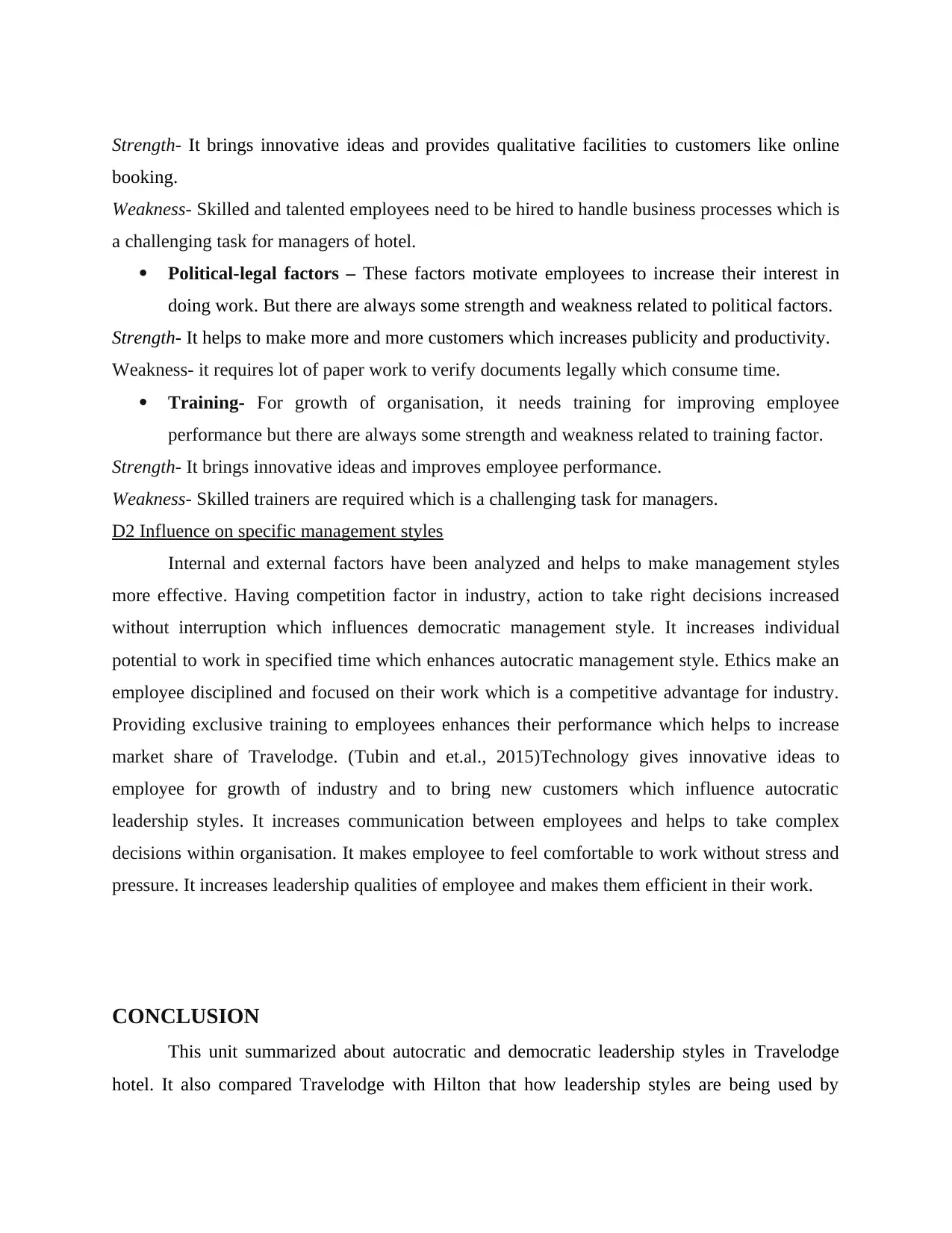
Strength- It brings innovative ideas and provides qualitative facilities to customers like online
booking.
Weakness- Skilled and talented employees need to be hired to handle business processes which is
a challenging task for managers of hotel.
Political-legal factors – These factors motivate employees to increase their interest in
doing work. But there are always some strength and weakness related to political factors.
Strength- It helps to make more and more customers which increases publicity and productivity.
Weakness- it requires lot of paper work to verify documents legally which consume time.
Training- For growth of organisation, it needs training for improving employee
performance but there are always some strength and weakness related to training factor.
Strength- It brings innovative ideas and improves employee performance.
Weakness- Skilled trainers are required which is a challenging task for managers.
D2 Influence on specific management styles
Internal and external factors have been analyzed and helps to make management styles
more effective. Having competition factor in industry, action to take right decisions increased
without interruption which influences democratic management style. It increases individual
potential to work in specified time which enhances autocratic management style. Ethics make an
employee disciplined and focused on their work which is a competitive advantage for industry.
Providing exclusive training to employees enhances their performance which helps to increase
market share of Travelodge. (Tubin and et.al., 2015)Technology gives innovative ideas to
employee for growth of industry and to bring new customers which influence autocratic
leadership styles. It increases communication between employees and helps to take complex
decisions within organisation. It makes employee to feel comfortable to work without stress and
pressure. It increases leadership qualities of employee and makes them efficient in their work.
CONCLUSION
This unit summarized about autocratic and democratic leadership styles in Travelodge
hotel. It also compared Travelodge with Hilton that how leadership styles are being used by
booking.
Weakness- Skilled and talented employees need to be hired to handle business processes which is
a challenging task for managers of hotel.
Political-legal factors – These factors motivate employees to increase their interest in
doing work. But there are always some strength and weakness related to political factors.
Strength- It helps to make more and more customers which increases publicity and productivity.
Weakness- it requires lot of paper work to verify documents legally which consume time.
Training- For growth of organisation, it needs training for improving employee
performance but there are always some strength and weakness related to training factor.
Strength- It brings innovative ideas and improves employee performance.
Weakness- Skilled trainers are required which is a challenging task for managers.
D2 Influence on specific management styles
Internal and external factors have been analyzed and helps to make management styles
more effective. Having competition factor in industry, action to take right decisions increased
without interruption which influences democratic management style. It increases individual
potential to work in specified time which enhances autocratic management style. Ethics make an
employee disciplined and focused on their work which is a competitive advantage for industry.
Providing exclusive training to employees enhances their performance which helps to increase
market share of Travelodge. (Tubin and et.al., 2015)Technology gives innovative ideas to
employee for growth of industry and to bring new customers which influence autocratic
leadership styles. It increases communication between employees and helps to take complex
decisions within organisation. It makes employee to feel comfortable to work without stress and
pressure. It increases leadership qualities of employee and makes them efficient in their work.
CONCLUSION
This unit summarized about autocratic and democratic leadership styles in Travelodge
hotel. It also compared Travelodge with Hilton that how leadership styles are being used by
Paraphrase This Document
Need a fresh take? Get an instant paraphrase of this document with our AI Paraphraser
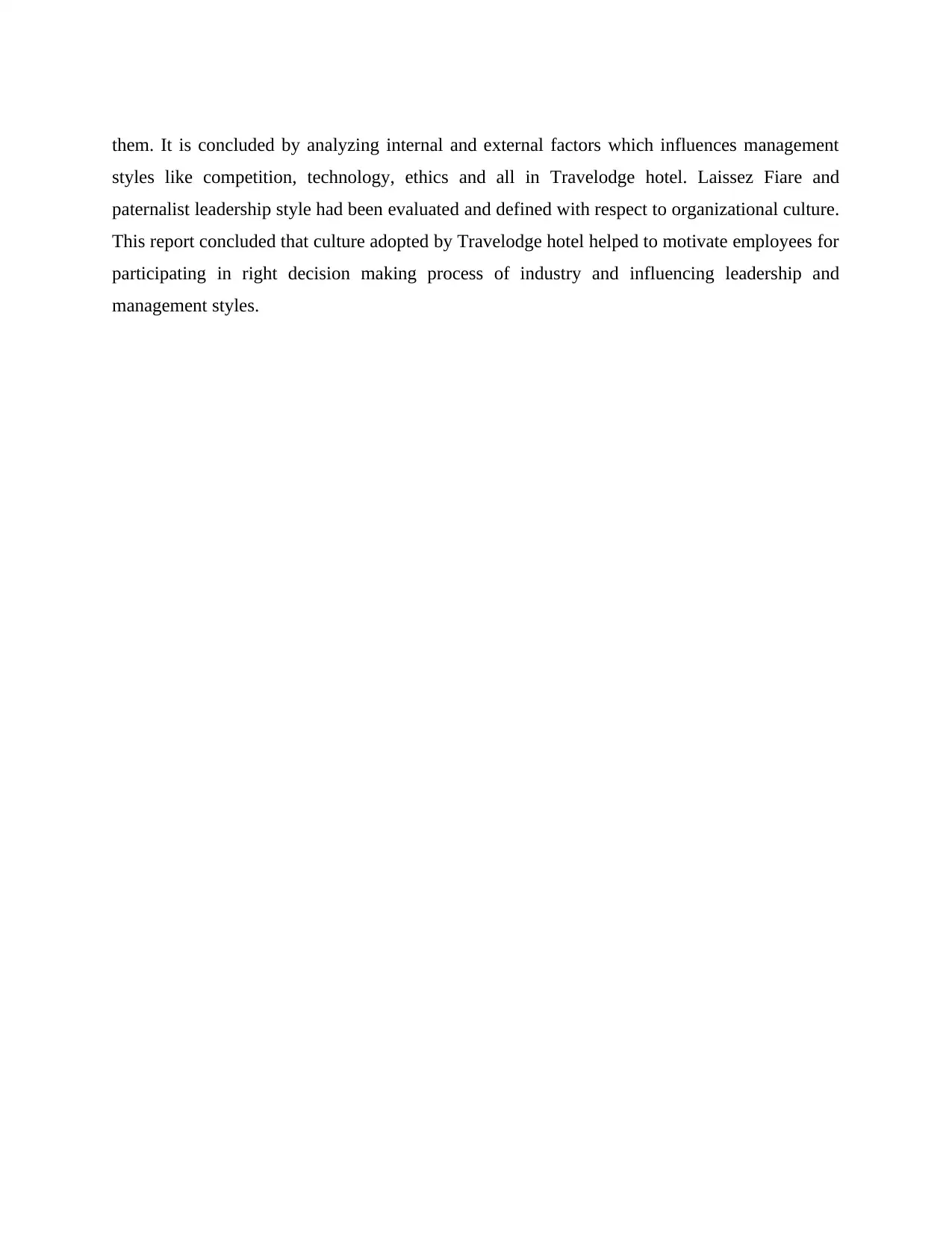
them. It is concluded by analyzing internal and external factors which influences management
styles like competition, technology, ethics and all in Travelodge hotel. Laissez Fiare and
paternalist leadership style had been evaluated and defined with respect to organizational culture.
This report concluded that culture adopted by Travelodge hotel helped to motivate employees for
participating in right decision making process of industry and influencing leadership and
management styles.
styles like competition, technology, ethics and all in Travelodge hotel. Laissez Fiare and
paternalist leadership style had been evaluated and defined with respect to organizational culture.
This report concluded that culture adopted by Travelodge hotel helped to motivate employees for
participating in right decision making process of industry and influencing leadership and
management styles.
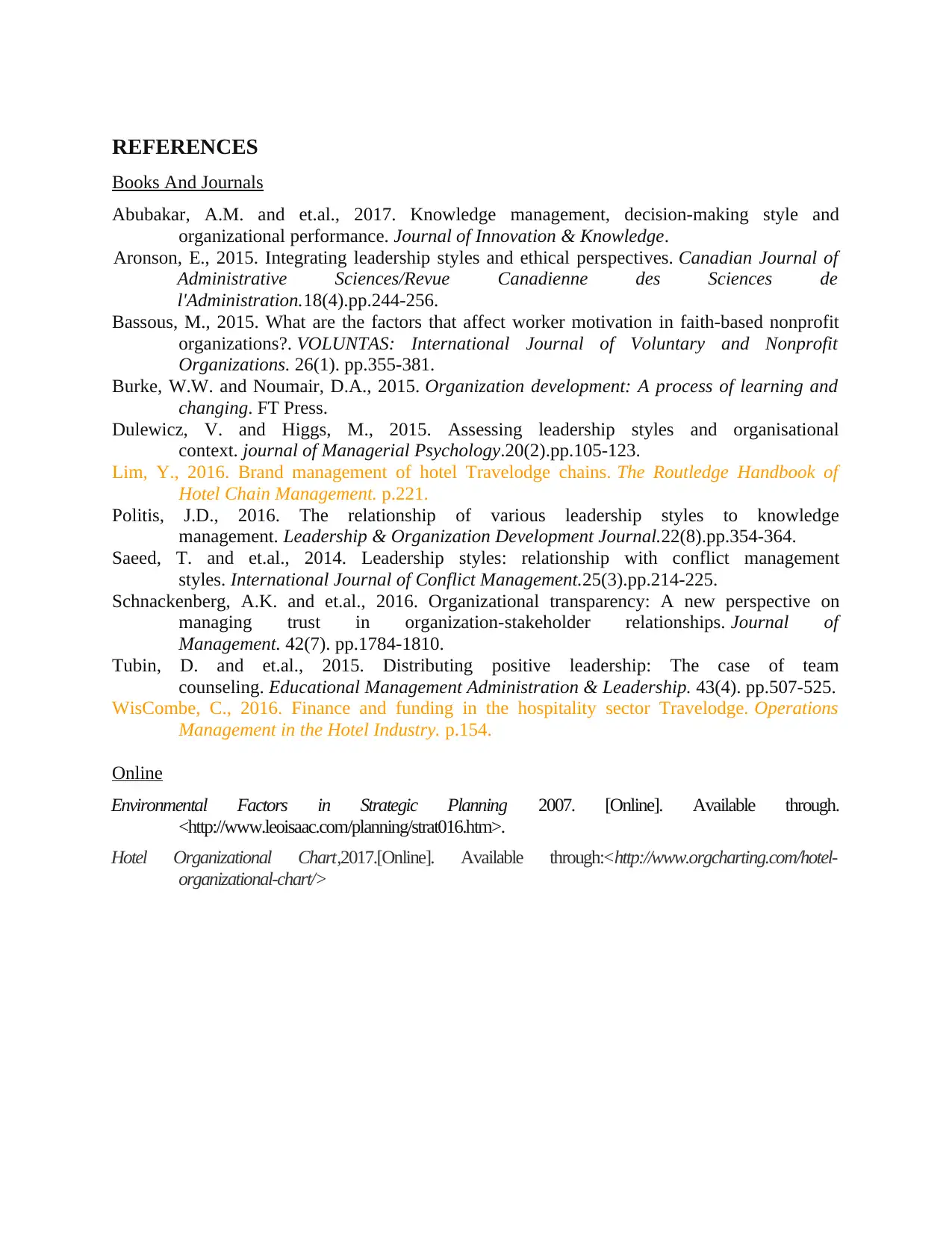
REFERENCES
Books And Journals
Abubakar, A.M. and et.al., 2017. Knowledge management, decision-making style and
organizational performance. Journal of Innovation & Knowledge.
Aronson, E., 2015. Integrating leadership styles and ethical perspectives. Canadian Journal of
Administrative Sciences/Revue Canadienne des Sciences de
l'Administration.18(4).pp.244-256.
Bassous, M., 2015. What are the factors that affect worker motivation in faith-based nonprofit
organizations?. VOLUNTAS: International Journal of Voluntary and Nonprofit
Organizations. 26(1). pp.355-381.
Burke, W.W. and Noumair, D.A., 2015. Organization development: A process of learning and
changing. FT Press.
Dulewicz, V. and Higgs, M., 2015. Assessing leadership styles and organisational
context. journal of Managerial Psychology.20(2).pp.105-123.
Lim, Y., 2016. Brand management of hotel Travelodge chains. The Routledge Handbook of
Hotel Chain Management. p.221.
Politis, J.D., 2016. The relationship of various leadership styles to knowledge
management. Leadership & Organization Development Journal.22(8).pp.354-364.
Saeed, T. and et.al., 2014. Leadership styles: relationship with conflict management
styles. International Journal of Conflict Management.25(3).pp.214-225.
Schnackenberg, A.K. and et.al., 2016. Organizational transparency: A new perspective on
managing trust in organization-stakeholder relationships. Journal of
Management. 42(7). pp.1784-1810.
Tubin, D. and et.al., 2015. Distributing positive leadership: The case of team
counseling. Educational Management Administration & Leadership. 43(4). pp.507-525.
WisCombe, C., 2016. Finance and funding in the hospitality sector Travelodge. Operations
Management in the Hotel Industry. p.154.
Online
Environmental Factors in Strategic Planning 2007. [Online]. Available through.
<http://www.leoisaac.com/planning/strat016.htm>.
Hotel Organizational Chart,2017.[Online]. Available through:<http://www.orgcharting.com/hotel-
organizational-chart/>
Books And Journals
Abubakar, A.M. and et.al., 2017. Knowledge management, decision-making style and
organizational performance. Journal of Innovation & Knowledge.
Aronson, E., 2015. Integrating leadership styles and ethical perspectives. Canadian Journal of
Administrative Sciences/Revue Canadienne des Sciences de
l'Administration.18(4).pp.244-256.
Bassous, M., 2015. What are the factors that affect worker motivation in faith-based nonprofit
organizations?. VOLUNTAS: International Journal of Voluntary and Nonprofit
Organizations. 26(1). pp.355-381.
Burke, W.W. and Noumair, D.A., 2015. Organization development: A process of learning and
changing. FT Press.
Dulewicz, V. and Higgs, M., 2015. Assessing leadership styles and organisational
context. journal of Managerial Psychology.20(2).pp.105-123.
Lim, Y., 2016. Brand management of hotel Travelodge chains. The Routledge Handbook of
Hotel Chain Management. p.221.
Politis, J.D., 2016. The relationship of various leadership styles to knowledge
management. Leadership & Organization Development Journal.22(8).pp.354-364.
Saeed, T. and et.al., 2014. Leadership styles: relationship with conflict management
styles. International Journal of Conflict Management.25(3).pp.214-225.
Schnackenberg, A.K. and et.al., 2016. Organizational transparency: A new perspective on
managing trust in organization-stakeholder relationships. Journal of
Management. 42(7). pp.1784-1810.
Tubin, D. and et.al., 2015. Distributing positive leadership: The case of team
counseling. Educational Management Administration & Leadership. 43(4). pp.507-525.
WisCombe, C., 2016. Finance and funding in the hospitality sector Travelodge. Operations
Management in the Hotel Industry. p.154.
Online
Environmental Factors in Strategic Planning 2007. [Online]. Available through.
<http://www.leoisaac.com/planning/strat016.htm>.
Hotel Organizational Chart,2017.[Online]. Available through:<http://www.orgcharting.com/hotel-
organizational-chart/>
⊘ This is a preview!⊘
Do you want full access?
Subscribe today to unlock all pages.

Trusted by 1+ million students worldwide
1 out of 12
Related Documents
Your All-in-One AI-Powered Toolkit for Academic Success.
+13062052269
info@desklib.com
Available 24*7 on WhatsApp / Email
![[object Object]](/_next/static/media/star-bottom.7253800d.svg)
Unlock your academic potential
Copyright © 2020–2026 A2Z Services. All Rights Reserved. Developed and managed by ZUCOL.





